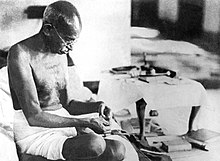Simple living
From Wikipedia, the free encyclopedia
Mohandas Gandhi spinning yarn in 1942. Gandhi believed in a life of simplicity and self-sufficiency.
Simple living encompasses a number of different voluntary practices to simplify one's lifestyle. These may include reducing one's possessions or increasing self-sufficiency, for example. Simple living may be characterized by individuals being satisfied with what they need rather than want.[1][2] Although asceticismgenerally promotes living simply and refraining from luxury and indulgence, not all proponents of simple living are ascetics.[3] Simple living is distinct from those living in forced poverty, as it is a voluntary lifestyle choice.
Adherents may choose simple living for a variety of personal reasons, such as spirituality, health, increase in 'quality time' for family and friends, reducing their personal ecological footprint, stress reduction, personal taste or frugality. Others cite socio-political goals aligned with the anti-consumerist movement, including conservation, degrowth, social justice,ethnic diversity and sustainable development.
Simple living can also be a reaction to materialism and conspicuous consumption. Thorstein Veblenhad denounced the materialistic society in The Theory of the Leisure Class (1899); Richard Greggcoined the term "voluntary simplicity" as one path to simple living, in The Value of Voluntary Simplicity (1936); E. F. Schumacher argued against the notion that "bigger is better" in Small Is Beautiful (1973); and Duane Elgin carried on the promotion of the simple life in Voluntary simplicity(1981)
open the link read on, .Tags : Knowledge

No comments:
Post a Comment